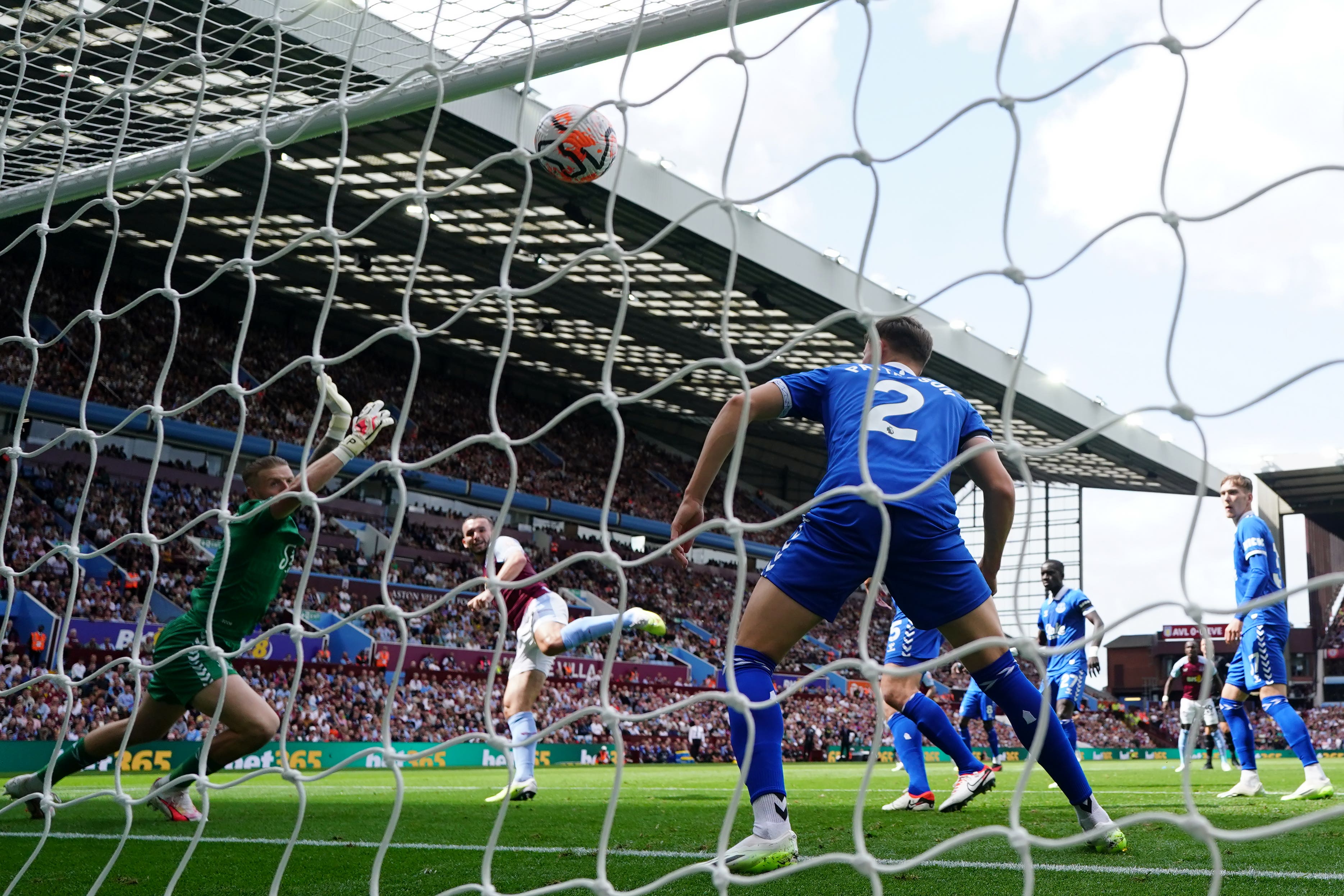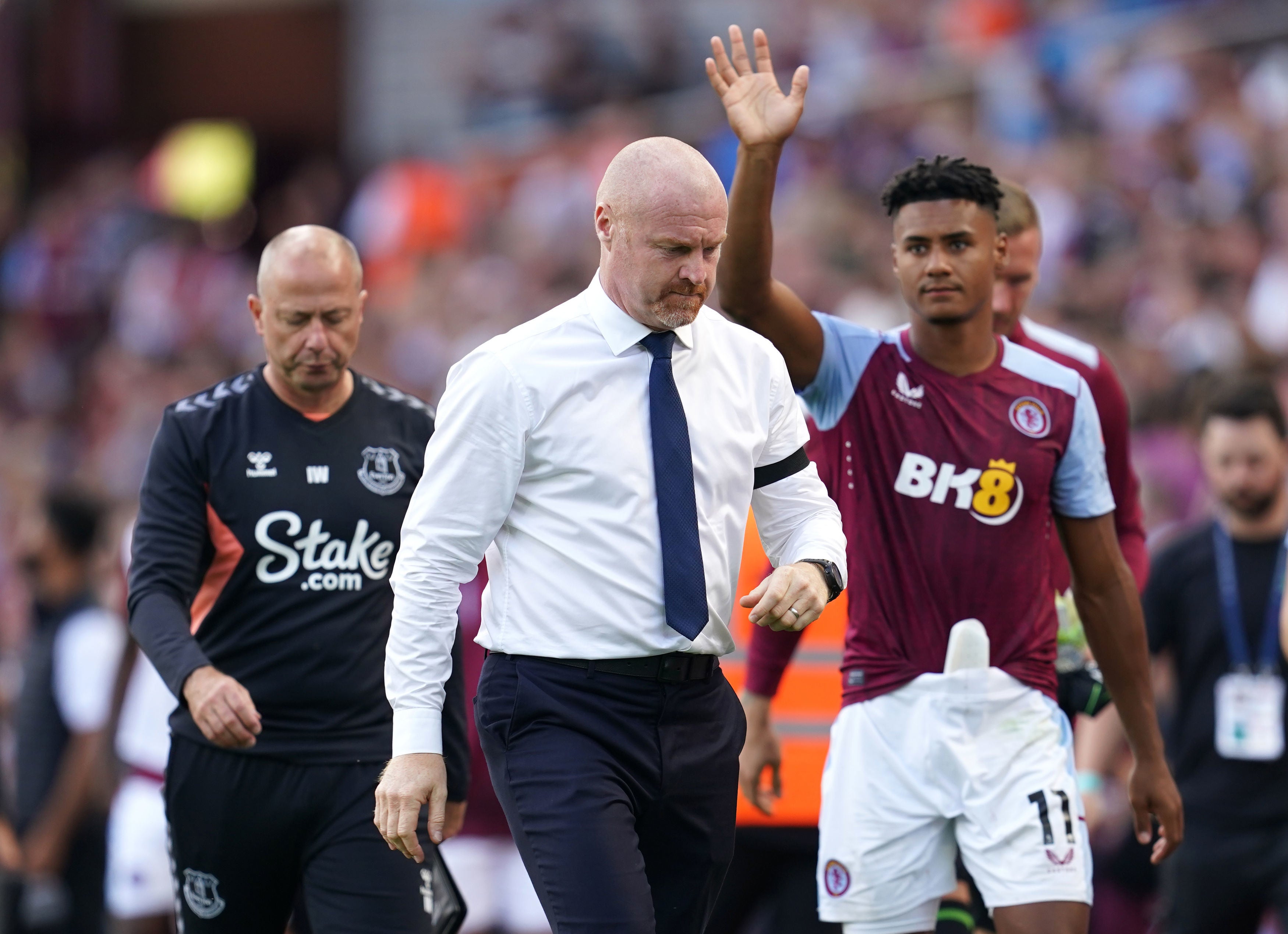Are Everton the first crisis club of the season?
The Toffees’ 4-0 loss to Aston Villa means they have started their season with two defeats and zero goals

Sean Dyche turned to clap the Everton fans, but he was applauding about 3,000 empty seats. Most of the supporters had gone. Even the M6 seemed more appealing than watching any more of Everton. Early-season optimism could have disappeared inside 90 minutes.
Sometimes history is made at historic clubs, but it isn’t always the right sort. For the first time since 1955/56, Everton have lost their first two league games of a season without scoring. They lost their first two last season, too, and their only scorer then was Lucas Digne, already an Aston Villa player. At the end of the season, Dyche argued Everton needed major change.
A 4-0 vanquishing at Villa Park offered some difference: more of the same in some respects, worse in others. It was a throwback to the thrashings under Frank Lampard, to Bournemouth and Brighton and Tottenham, the capitulations without mitigation. “You just smell the group go soft very quickly,” said Dyche. “That was what I felt before we got here.” And if that could have been an attempt to shift the blame, this Everton were uncharacteristic of a Dyche team: They can be short of inspiration, but they rarely lack organisation or spirit– the basics that the manager believes are the foundation. “The defending, body language and intent weren’t there,” said Dyche. “It looked too lackadaisical.” Many an adjective has been applied to a Dyche team over the years, but lackadaisical has rarely been among them.
Or shambolic, but there was an ineptitude that surprised a manager who has long been a byword for his brand of efficiency. “A headscratcher,” he said. “We were way off and that was a surprise to me. Who has performed? Hardly anyone. Today at half time, it was like, ‘Where do I start?’ I could have taken the whole team off.” He settled for removing the cautioned Idrissa Gueye. “These collective down days do come,” Dyche said. But they rarely involve going so far down.
There was a feeling Everton could have done with a year of dull pragmatism, of a forgettable grind to 12th or 13th. Instead, this was a display to stake their case to be the season’s first crisis club; Saturday’s meeting with Wolves has the look of an August relegation six-pointer. In May, Dyche argued that annual battles against the drop had to become a thing of the past, that staying up was nothing to celebrate. Now any position above the dotted line may be something they would settle for.

Now the problems are both multiplying and familiar. For those playing Everton bingo, there was a Dominic Calvert-Lewin injury and a Michael Keane mistake; two, each hideous, both costing goals.
When Dyche restored his old Burnley ally to the team in spring, it took 10 games for Keane to be dropped. Everton have conceded 20 goals in that time. Two matches into this season, he may be suffering from a similar crisis of confidence. Now, however, there is no Yerry Mina or Conor Coady to come in. If Everton are more dependent on Keane at the back, they are still over-reliant on the luckless Calvert-Lewin.
That dependence might be eased by Che Adams, should he sign, though the reality is that he scored five league goals for a team who finished 20th last season. Everton contrived to start this campaign seemingly unprepared for it: One attacking signing, Arnaut Danjuma, has not been deemed fit to start either game; another, Youssef Chermiti, is yet to be on the bench yet after missing part of pre-season and, in any case, is deemed a project for the long term. The third, Jack Harrison, was wanted by Villa, joined Everton but arrived injured.
And injuries are the constant context. Even two of those who were invariably fit are now out – Dwight McNeil before a ball was kicked, Alex Iwobi hamstrung at Villa Park. Already short of available strikers, now they are lacking compelling options on the wings; Demarai Gray may be headed for the exit, the target Wilfried Gnonto has not yet forced his way out of Leeds, and James Garner has been pressed into emergency service as a right-sided midfielder.

Bottom of the actual table, near the top of the injury table, Everton already look like fielding a patched-up team for the first of many a must-win game. There are longstanding issues – they have rarely looked comfortable in possession or had enough of the ball since Carlo Ancelotti left – and recurring themes. Dyche’s grim warnings are becoming one of them.
“There’s no magic wand, there never was when I got the job, and there are no shortcuts, because shortcuts in football usually cost a lot of money,” he counselled. But, while 2023 has been a year of austerity, Everton have spent around £700m in seven years of Farhad Moshiri’s ownership. And a collective down day could prompt fears that this will be a down season.



Join our commenting forum
Join thought-provoking conversations, follow other Independent readers and see their replies
Comments